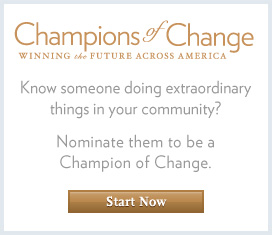Champions of Change Blog
Converting Our Fleet of Ships to Natural Gas
Posted by on May 20, 2014 at 3:37 PM EDT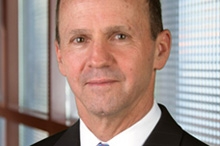
Anthony Chiarello is being honored as a Transportation Ladders of Opportunity Champion of Change.
I’m fourth generation in the shipping business and am in my 35th year in the maritime and logistics industry. To be honored for leading the movement to natural gas as a marine fuel is both exciting and humbling.
When we announced TOTE would be the first U.S. maritime company to convert our fleet of ships to natural gas, we knew we were in a unique position to create major change in the U.S. transportation industry.
Change is often fueled by challenge. The challenges posed to our company by the North American Emissions Control Area quickly became an opportunity to lead the industry to cleaner fuels beyond diesel. We’ve been bullish in our statements that we believe all new ships built for the U.S. domestic trades will burn liquid natural gas (LNG) as fuel. The response from other maritime companies has been nothing short of a tidal shift; orders for LNG ship construction accelerated after we announced plans to convert our ships that serve Alaska and build new ships, the first container ships in the world to be powered by LNG, for Puerto Rico.
As a Jones Act domestic carrier, we’re uniquely positioned to create real change in the supply conundrum -- availability of fuel is a big hurdle for most transportation sectors to change over to clean burning natural gas. Our regular service routes create enough of a steady demand to entice fuel partners to build liquefaction plants in our ports of call -- thus making LNG supply available to others in those markets. Supply in Jacksonville, Florida and Tacoma, Washington will serve the Southeast and Pacific Northwest with natural gas that can be used for ships, trucks, and rail.
As more maritime and transportation companies move to natural gas, the benefits will grow exponentially. The impetus was improving air quality, but we also know that moving to a domestically sourced fuel will increase reliability for our critical supply chain and the environmental and operational safety record of LNG is unmatched.
Despite 40,000 American ships and 500,000 mariners operating in our coastal and inland waterways, marine shipping is largely unseen as Americans are more disconnected from commercial U.S. ports. What most Americans don’t realize is that 90 percent of all consumer freight cargo moves on ships at some point in the supply chain. I’m hopeful that this award will bring some well-deserved recognition to the maritime industry as the most environmentally friendly, safest and economical mode of freight transportation.
Change of this magnitude requires strong support from partners and regulatory agencies: EPA, helping to facilitate engine conversions; the U.S. Coast Guard, working to create new regulations; Wärtsilä, designing new LNG engines for our ships; General Dynamics NASSCO, building a ship that’s never been built before; partners creating fuel infrastructure; and our parent company Saltchuk, which is both able and willing to invest to “do the right thing."
It is an honor to stand among the 2014 Transportation Champions of Change representing TOTE and Saltchuk. My colleagues and I are proud of our investments into new technology as a reflection of our commitment to the people and customers of Alaska and Puerto Rico. We’re equally pleased to help move the U.S. toward natural gas as a marine transportation fuel while providing the most advanced, safe, reliable service possible.
Anthony Chiarello is President and CEO of TOTE.
Learn more aboutCelebrating Champions for Health in the AAPI Community
Posted by on May 13, 2014 at 2:02 PM EDTFor too long, many members of the Asian American, Native Hawaiian, and Pacific Islander community have lacked access to quality, affordable health care. Consider these statistics:
- One in four Korean Americans is uninsured;
- Nearly 40% of Asian American women over the age of 40 don’t get routine mammograms;
- One in four Asian Americans over the age of 18 – and one in three Native Hawaiians and Pacific Islanders – has not seen a doctor in the last year.
The Affordable Care Act provides an opportunity to provide nearly two million uninsured Asian Americans and Pacific Islanders with quality, affordable health care. In addition, eight out of ten uninsured AAPIs may be eligible for financial assistance through Medicaid, CHIP, or tax credits in the Health Insurance Marketplace. That’s why, according to a report released by HHS last week, of enrollees in the Marketplace, 8% were Asian American, Native Hawaiian, or Pacific Islander.
Across the country, organizations and individuals stepped up to do their part to educate the AAPI community about the Affordable Care Act. And last month, the White House and U.S. Department of Health & Human Services (HHS) honored the following 11 advocates and community leaders as “Champions of Change” for their work to educate Asian Americans and Pacific Islanders about the Affordable Care Act:
- Teresita Batayola, CEO, International Community Health Services (Seattle, WA)
- Sophie Duong, CEO/President, Nationwide Viet Radio (Falls Church, VA)
- Howard J. Eng, Assistant Professor and Director of the Southwest Border Rural Health Research Center, The University of Arizona College of Public Health (Tucson, AZ)
- Minja Hong, Program Coordinator of Healthcare Access Services, Korean Community Services of Metropolitan New York (New York, NY)
- Priscilla Huang, Action for Health Justice (Washington, DC)
- Amy Jones, Director of Health & Social Services, Southeast Asian Mutual Assistance Association Coalition, Inc. (Philadelphia, PA)
- Manjusha P. Kulkarni, Executive Director, South Asian Network (Artesia, CA)
- Ranjana Paintal, Program Manager, Asian Health Coalition of Illinois (Chicago, IL)
- Cathy Phan, Affordable Care Act Program Coordinator, Asian American Health Coalition - HOPE Clinic (Houston, TX)
- Bruce Thao, Director of Programs, Hmong American Partnership and Hmong National Development (St. Paul, MN)
- Cathy Vue, Program Coordinator, Asian Services In Action, Inc. (Cleveland, OH)
Gautam Raghavan is Associate Director of the Office of Public Engagement.
Learn more about Health CareServing AAPI Communities in the Midwest
Posted by on May 13, 2014 at 1:54 PM EDT
Ranjana Paintal is being honored as a Health in the AAPI Community Champion of Change.
I am honored to be chosen along with my fellow counterparts as a Champion of Change. Over the last year, I have served as program manager for the Asian Health Coalition’s partnership consortium around education, outreach and enrollment to underserved Asian American and Pacific Islanders (AAPIs) communities in Illinois, which has been made possible through the Affordable Care Act. My participation at the local level has been fulfilling both on a personal and professional level in this landmark national effort. However, this award magnifies this sense of fulfillment because it furthers one of our agency’s most significant goals- to bring attention to the challenges of the marginalized immigrant and refugee communities in Illinois.
“No community should be invisible to its government” said President Barack Obama when he unveiled his vision to meet the growing and unmet needs of this country’s AAPI community a few years ago. These words have been central to our mission at the Asian Health Coalition as many of the immigrant communities that we work with have historically lacked health insurance and access to basic preventative care.
Illinois is home to the 5th largest AAPI population in the nation and also the largest in the Midwest region. As more than two-thirds of AAPIs in Illinois are immigrants, the passage of the Affordable Care Act presents an amazing opportunity to address the needs of the communities that our consortium serves and allows them to have access to health care services which we regard as a basic human right.
Our consortium of community-based organizations and their certified navigators have been cultural brokers in the education, outreach and enrollment of their community members. Right from the beginning, our navigators educated each of the unique populations that they served about the Affordable Care Act and how it could help them, and then followed up to ensure that those needing assistance in the enrollment process received the help that they needed. Culturally sensitive and language appropriate educational materials were created with feedback from our community partners; ethnic news media outlets, and key stakeholders including community leaders were educated to help spread the word within their networks. As a result, these communities had access to simple and jargon-free information in their native language, were encouraged to sign up from those they trusted most (faith leaders, community leaders and elders), and had trustworthy spokespeople from within their community who they could rely on to navigate them through the enrollment process. Thanks to the efforts of my colleagues and our partners, we had an incredibly successful enrollment period, surpassing our enrollment goals and educating thousands of individuals.
As a mother of 2 young children it gives me peace of mind to know that with the help of my health insurance I am better able to take care of myself so that I can take care of them. I look forward to the day when every parent in this country can say this, no matter what community they live in, what language they speak and where they are from. I’m proud that I was able to play a role in this historic initiative that will hopefully bring us to that day.
Ranjana Paintal is Program Manager for Asian Health Coalition of Illinois
Learn more about Health CareMaking Health Care a Reality
Posted by on May 13, 2014 at 1:52 PM EDT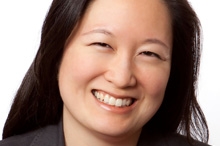
Priscilla Huang is being honored as a Health in the AAPI Community Champion of Change.
Of the over 2 million Asian Americans, Native Hawaiians and Pacific Islanders (AAPI) who are uninsured, Bishnu Kamar was just one of the many. She was one of the many people who lived in fear of what might happen when they get sick and one of the many who could not afford quality coverage no matter how hard she worked as a social worker in her Philadelphia community.
Through the Affordable Care Act, Bishnu was able to get covered and it now offers new opportunities for better health for millions of other AAPIs just like her. This is why Action for Health Justice was created. It was co-founded by my organization, the Asian & Pacific Islander American Health Forum, the Association of Asian Pacific Community Health Organizations, Asian Americans Advancing Justice | AAJC and Asian Americans Advancing Justice | Los Angeles.
We launched this national, coordinated initiative because we wanted to ensure the Affordable Care Act was not just a promise, but a reality for AAPIs. With communities spanning 50 different ethnicities and speaking more than 100 different languages, the only way to ensure success was to develop culturally and linguistically tailored outreach strategies.
Together, we tackled the challenge head-on. We leveraged the expertise and reach of national partners and the collective forces of more than 70 community-based organizations and health centers, implementing a multi-part strategy rooted in and driven by community need. On the ground in 21 states, we channeled our energies to where assistance was most needed: immigrant families facing complex eligibility questions and those with language barriers. Most importantly, we knew that providing education would not be enough. To be the most effective, we combined education through trusted messengers with new resources, coordinated efforts tailored specifically to help limited-English-proficient Americans get covered and worked closely with enrollment assisters to monitor and troubleshoot the enrollment process.
From providing tens of thousands of AAPIs with information, to large town halls in California and beyond, we have gone to where our communities live, work, play and worship to promote the first open enrollment period. For many of the people we helped, Action for Health Justice partners were the first and only source of assistance they received.
Our work would never have been possible without the tireless efforts of our community partners and health centers. When I hear coverage stories like Bishnu’s, or the many others Action for Health Justice helped, the Affordable Care Act becomes a little more real. With the first enrollment period behind us, we at Action for Health Justice remain committed to educating AAPIs and all communities about their health care options now and beyond. Action for Health Justice is a testament to the power and strength that can come from collective action. I am humbled to be a part of that and honored to make health care a reality for so many.
Priscilla Huang is Policy Director for the Asian & Pacific Islander American Health Forum, an organization that co-founded Action for Health Justice along with the Association of Asian Pacific Community Health Organizations, Asian Americans Advancing Justice | AAJC, and Asian Americans Advancing Justice | Los Angeles.
Learn more about Health CareBringing Health Insurance to AAPI Immigrants in New York
Posted by on May 13, 2014 at 1:50 PM EDT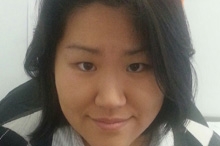
Minja Hong is being honored as a Health in the AAPI Community Champion of Change.
The New York Metropolitan area where my organization serves is often the initial stepping stone for first generation immigrants who choose to make their lives here in the United States. They come here to work, to educate their children, and to create homes. This is no less true of members of the Korean community. Therefore, Korean Community Services’ mission is to support their aspirations through ESL classes, job training, and after-school classes that create culturally and linguistically appropriate social safety nets that make for stronger families and communities.
My role as a Community Health Advocate, and as a state certified Navigator, allows me to understand all the practical challenges of receiving equal access healthcare, even in a diverse city such as ours. When open enrollment started, roughly one out of four individuals in the Korean community, were estimated to be without insurance due to linguistic, cultural, and financial barriers.
As a result, the Navigators at my organization and I, needed to identify and problem solve how we would address concerns specific to the immigrant population when it came to this historical change in our Nation’s healthcare law. Through the support and collaboration with other minority organizations in New York we were able to find much needed answers and apply them while still maintaining full enrollment schedules. In addition, we were compelled to add New Jersey Korean Americans to our roster of clients because of the overwhelming need for language competent services. To accomplish this, my colleagues and I went through another round of training specific to the federal marketplace and traveled to New Jersey sites to provide services throughout the entire open enrollment period. I was also privileged to be able to serve the Japanese community in the region in learning about their options in order to participate more fully in the healthcare reform.
Since our branch office is located in Midtown Manhattan it soon became evident to me that our role as bi-lingual Navigators was not only about exposing the challenges and distinctions in securing equal access healthcare to minority groups, but more about finding a common ground with the entire community. Regardless of race, language, creed or gender, the need to be healthy and to make sure one’s children are healthy was always the same. I am privileged to be able to work with driven and far-seeing colleagues, both in and outside my immediate organization, that continue to persevere in ensuring that people are empowered to make their own healthcare choices through education and changes in policy. My hope, going forward, is that despite the difficulties, or perhaps because of them, we find more common ground in the things that affect us all, such as access to healthcare, so that we can move toward creating healthy and productive communities.
Minja Hong is Program Coordinator of Healthcare Access Services at Korean Community Services of Metropolitan New York
Learn more about Health CareHelping South Asians Get Covered in California
Posted by on May 13, 2014 at 1:41 PM EDT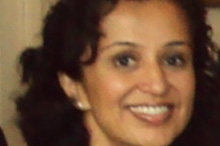
Manju Kulkarni is being honored as a Health in the AAPI Community Champion of Change.
South Asian Network (SAN) is a community-based organization, dedicated to the mission of promoting the health, solidarity and empowerment of South Asian Americans in Southern California. Founded in 1990, SAN is one of the oldest South Asian American community-based organizations in the nation. Our offices are located in the City of Artesia in the heart of “Little India.”
Since 2003, SAN has been working to improve the health of the South Asian community in Southern California. Currently, the Community Health Action Initiative (CHAI) serves the health and health care access needs of South Asian Americans and immigrants in the following ways: (1) outreach and education on the benefits of the Affordable Care Act and enrollment assistance in Covered California, California’s health benefit exchange; (2) outreach and enrollment assistance in other public benefit programs including Medicaid, Medicare, Food Stamps and SSI; (3) patient navigation services; (4) health education on cancer prevention, cardiovascular disease, diabetes, stress management and depression; (5) a caregivers’ support group for those individuals caring for seniors; (6) mental health services for adults, children and seniors; and (7) a seniors’ walking club and nutrition program.
SAN was the only South Asian organization in California to be certified to provide outreach, education and enrollment assistance in the state’s health benefit exchange, Covered California. This allowed our staff to conduct outreach to over 2400 individuals. In addition, SAN received coverage in two national media outlets, the LA Times and PRI’s The World, in one state resource, California Health, as well as several local ethnic media outlets on our work to educate South Asians on the benefits of the Affordable Care Act and assist with enrollment in Covered California.
Our staff and board of directors are most proud of the social justice framework which enables us to envision a more just and equitable world, our efforts to engage in prevention as much as service provision, and our success at incorporating diversity of the South Asian community throughout the organization.
Manjusha Kulkarni is Executive Director of South Asian Network (SAN).
Learn more about Health Care
- &lsaquo previous
- …
- 21
- 22
- 23
- 24
- 25
- 26
- 27
- 28
- 29
- …
- next &rsaquo

